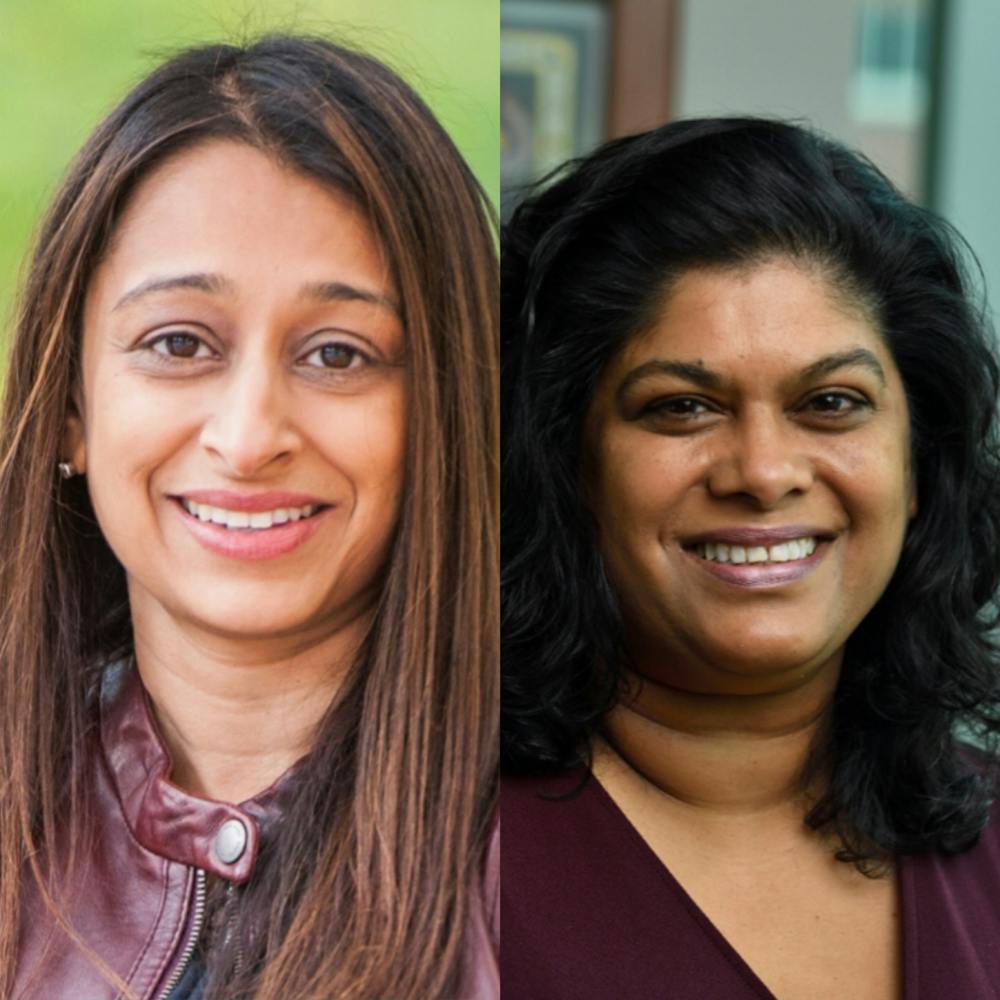Ashani Weeraratna and Dr. Nilofer Azad, both professors and cancer researchers at Hopkins, were appointed to the National Cancer Advisory Board along with five other clinicians and researchers by President Joe Biden on Sept. 15.
Weeraratna is a professor of oncology at the School of Medicine, a Bloomberg distinguished professor and chair of the Department of Biochemistry and Molecular Biology at the School of Public Health. As a cancer researcher, she co-leads the Cancer Invasion and Metastasis Program at the Sidney Kimmel Comprehensive Cancer Center.
Azad is a professor of oncology at the School of Medicine and co-director of the Cancer Center’s Cancer Genetics and Epigenetics, one of the core cancer research groups at Hopkins. For the last ten years, she has been one of the leaders in the Developmental Therapeutics Clinical Trials Program at the Cancer Center. As a clinical translational researcher, Azad focuses primarily on combination therapies in gastrointestinal cancer.
Weeraratna recalled learning the news in an interview with The News-Letter.
“It came in the form of an email. At first, I ignored it, because I thought it was a hoax. But when I realized it wasn’t one, I was very emotional about it,” she said.
Azad also discussed her feelings when she heard the announcement in an interview with The News-Letter.
“I felt thrilled and honored,” she said. “This particular president and this particular national leadership at the [National] Cancer Institute [NCI] is a perfect combination for making big progress.”
Weeraratna’s interest in biology was sparked early in school. She started to study more about cancer after a person with whom she was close passed away from the disease.
“The more I learn about [cancer research], the more and more fascinated I become with it,” she said said.
Weeraratna explained that she was able to spend two years between undergraduate and graduate schools working in a cancer lab at Hopkins, and this experience encouraged her to conduct cancer research as a career.
Currently, Weeraratna is researching melanoma and metastasis.
“I’m very interested in the process of metastasis and how cancerous cells move from primary sites to distant sites,” she said. “I started researching a gene that is really important in governing the initial invasion and dissemination of melanoma.”
Azad became interested in oncology during her training as a medical practitioner.
“Ever since my training, there has been an explosion in the understanding of the underlying biology of cancer. That has really opened up the opportunity for us to be able to target therapeutics in a really sophisticated and rational way,” Azad said.
Azad discussed the unexpected turn in her career that eventually led her to become a cancer researcher.
“At first, I really thought I was going to become a practitioner. I was very lucky to be trained under an intensive research program at the [NCI] as a fellow, which really opened my eyes to see how creative we can be while taking care of patients to come up with new treatments,” she said. “The idea of developing close relationships with patients as you do cutting-edge work really hooks me.”
Both women are from the Black Indigenous People of Color (BIPOC) community in the fields of science, technology, engineering and mathematics.
“I have faced a lot of challenges that I think an average scientist may not face. One way I overcome those challenges is to have a really good sense of humor about it all,” Weeraratna said. “Number two is to find my own voice and to be able to speak up when something is happening that should not be happening.”
Azad shared her perspective and experience.
“This is the era for women,” Azad said. “As a woman of color, I have been very lucky to have mentorships from other very strong women and men, and that has been very supportive of developing my career.”
She also discussed the special nature of working in scientific fields.
“I think science is the great equalizer. If you are good at what you do, that would already give you a leg up. But I don’t want to minimize the challenges people of color and women face in science,” Azad said.
Azad shared her suggestion for young BIPOC women studying science.
“To me, my strategy has been to really be thoughtful about mentorship and to identify people with similar passion for science and system of values,” she said. “Then, interact with these people as much as possible [through] collaboration.”
Looking ahead, Weeraratna talked about the responsibilities that come with her appointment to the Board.
“One responsibility is to serve our community of cancer patients, researchers and educators as best as I can. [It is also important] to listen to what the challenges are, especially to our junior investigators,” she said.
Weeraratna is also determined to improve the situation for many female researchers during COVID-19. She claimed that the scientific research field has lost many young women from academia and believes that understanding how to support them and prevent that loss from happening in the future is one of the critical areas to focus on.
Azad believes the goals that accompany her Board appointment remain the same as they have throughout her career.
“We all try to do the best we can for our patients and for science, and I think [the appointment] is one more part of that mission,” she said.





